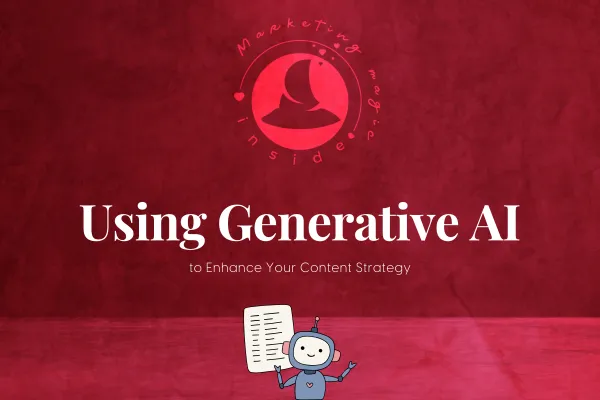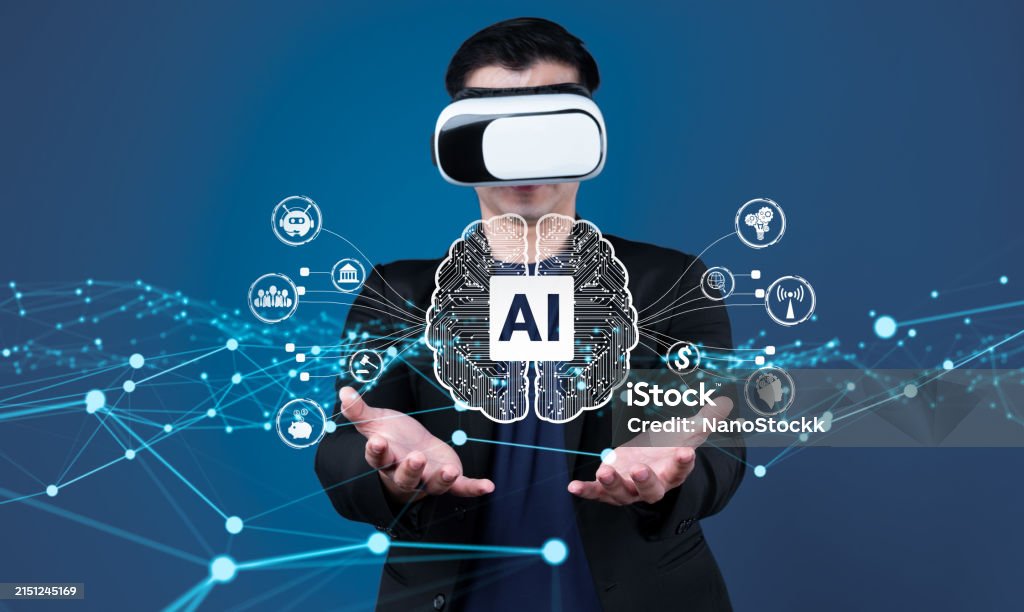
Using Generative AI to Enhance Your Content Strategy
Using Generative AI to Enhance Your Content Strategy
Generative AI is changing the way marketers approach content creation.
Using AI tools, marketers can generate fresh ideas, craft diverse text formats, and elevate their writing with greater efficiency and precision. These tools enable teams to optimize their time, refine messaging, and deliver highly personalized content that connects with audiences.
The intent of this blog is to explore actionable ways marketers can integrate generative AI into their workflows for idea generation, copy editing, and personalization.
This is not about the tools is about the process itself and how you still play a fundamental role.
Integrating Generative AI into Your Workflow
While there are many tools available, the real value of generative AI lies in how you integrate it into your content creation process. The focus should be on streamlining workflows, enhancing collaboration, and amplifying creativity—not replacing marketers but empowering them to make smarter, faster decisions. Here’s how to approach this:
Start with Strategy: Before using AI, define your content goals and audience. AI is most effective when guided by a clear strategy, ensuring that its outputs align with your broader objectives.
Complement, Don’t Replace: Use AI to assist in areas where efficiency or variety is needed, like generating multiple drafts or exploring fresh angles. Then, refine the content with your expertise to ensure it resonates authentically.
Integrate with Teamwork: Incorporate AI into collaborative workflows. For example, brainstorm ideas with your team, then use AI to expand on those ideas or test out variations. AI can also help in sparking discussions around what works best.
Iterate Thoughtfully: Treat AI-generated content as a starting point. Review, revise, and adapt outputs to meet your standards of creativity and quality. Remember, AI lacks the intuition and emotional intelligence that only you bring to the table.
Stay Adaptive: Regularly evaluate how AI fits into your process. As tools evolve, new opportunities may emerge to simplify tasks or open creative possibilities you hadn’t considered before.
By focusing on how AI supports your existing expertise and workflows, you ensure that its integration enhances, rather than detracts from, the creative and strategic role marketers play.

We must shift our focus from specific tools to understanding how generative AI can enhance our processes.
The intent behind using AI should be rooted in improving research, refining writing style, optimizing content for SEO, and delivering personalized experiences.
Rather than emphasizing tools, consider how AI supports your workflow:
Research: AI can quickly gather and summarize large volumes of data, allowing you to focus on strategy rather than spending hours collecting information. Use it to uncover trends, identify audience preferences, or analyze competitors.
Style Refinement: AI offers suggestions to maintain consistent tone and voice across different types of content. Whether drafting thought leadership pieces or quick ad copy, it can provide options that align with your brand identity.
SEO Optimization: Generative AI helps analyze keywords, refine meta descriptions, and structure content to perform well in search engines. This ensures your content remains competitive in an evolving digital landscape.
Personalization: By analyzing user behavior and preferences, AI enables you to tailor messages that deeply resonate with your audience. Personalized content drives higher engagement and builds stronger connections.
The focus isn’t about replacing creativity but amplifying it. By integrating these processes thoughtfully, marketers can elevate their impact while staying true to their strategic vision.
Benefits and Challenges of Generative AI in Content Marketing
Benefits
Increased Efficiency: Automate repetitive tasks like writing product descriptions or captions, enabling you to produce more content in less time.
Improved Quality: AI tools refine sentence structure, ensure clarity, and even suggest improvements for conciseness and impact.
Personalization: AI analyzes user data to tailor content to individual preferences, creating stronger connections with your audience.
Cost Savings: Automating content creation reduces the need for larger writing teams.
Strategic Focus: By offloading routine tasks to AI, you can dedicate more time to high-level initiatives such as campaign planning and performance analysis.
Challenges
Accuracy and Bias: AI models reflect the biases and inaccuracies of their training data, which can compromise content quality. (a challenge we face even without AI!)
Creativity and Originality: While AI can generate ideas, it may lack the nuanced understanding and originality of a human writer.
Ethical Considerations: Misuse of AI or over-reliance can raise ethical questions around misinformation and job displacement.
To mitigate these challenges, marketers should always review AI-generated content critically, ensuring it aligns with brand values and accuracy standards.
Idea Generation with Generative AI
One of AI’s most valuable strengths is its ability to generate fresh ideas and overcome creative blocks.
Here’s how:
Overcome Writer’s Block: Provide the AI with a brief about your topic and audience, and it can generate a list of potential blog ideas, titles, or captions.
Explore New Angles: Use AI to examine topics from different perspectives to create well-rounded content.
Brainstorm Formats: AI tools can suggest innovative content formats, like quizzes, infographics, or interactive stories.
Example: Idea Generation Prompt
Imagine you’re stuck brainstorming blog topics about AI in marketing. You could use a prompt like:
“Generate 10 blog post ideas on the benefits of generative AI in content marketing.”
And get results like:
Idea:
5 Ways Generative AI Can Help You Create Better Content in Less Time
Description:
Explore how AI automates content creation, improves quality, and boosts personalization.
Idea:
How to Use Generative AI to Personalize Your Marketing Messages
Description:
A guide on crafting tailored emails, copy, and social posts using AI.
Idea:
Generative AI for SEO: How to Optimize Your Content
Description:
Insights into using AI for keyword research and content optimization.
Beyond blog ideas, you can also use AI to generate storyboards, ad concepts, or even customer journey narratives.
Copy Editing with Generative AI
AI tools can be your virtual editor, streamlining your copywriting process:
Grammar and Spelling: AI-powered checkers identify and fix errors you might miss.
Sentence Refinement: AI can restructure complex sentences or suggest alternative phrasing for clarity and flow.
Conciseness: AI helps eliminate fluff, ensuring your content is impactful and to the point.
For instance, if you’re refining a sentence like: “This product offers a variety of unique features that are helpful for solving customer problems,” AI might suggest: “This product’s unique features solve customer problems effectively.”
AI editing tools offer insights into tone, readability, and engagement, allowing you to fine-tune your content for specific audiences.
Personalization with Generative AI
Personalization is at the heart of impactful marketing. Generative AI helps you:
Recommend Relevant Content: Analyze user data to suggest articles, products, or services tailored to their needs.
Dynamic Copy Creation: Customize email subject lines, website copy, and ad content based on user behavior and preferences.
Enhanced Search and Discovery: Power intelligent search functions that deliver highly personalized results.
Example: E-commerce Personalization
An online retailer struggling to boost sales could use AI to recommend products based on individual browsing behavior. The result? Higher conversions and happier customers.
AI can also be used to personalize newsletters by dynamically inserting product recommendations or customizing offers based on the recipient’s preferences. These tailored approaches lead to increased engagement and loyalty.
Real-World Applications
Many companies are already using AI to transform their content strategies:
Walmart: Creates personalized marketing messages for individual customers with AI.
Mercedes-Benz: Offers personalized in-car experiences, suggesting tailored routes, entertainment, and news.
In addition, smaller businesses are tapping into tools like Canva’s Magic Write and Shopify’s AI tools to create content that’s both scalable and effective. These platforms level the playing field, making advanced AI accessible to brands of all sizes.
AI for Content Strategy and SEO
Generative AI can enhance your content strategy and SEO efforts:
Keyword Research: Analyze competitor content and identify high-value keywords.
Content Optimization: Improve headlines, meta descriptions, and structure for better rankings.
Scheduling Insights: Use AI to determine the best times to publish for maximum reach.
AI-driven processes provide marketers with actionable insights for crafting SEO-friendly content that balances high performance with readability. By integrating these advanced methods into your SEO strategies, you can analyze trends, identify key opportunities, and create content that remains competitive in an ever-changing digital landscape.
Final Thoughts
AI is reshaping content marketing by improving efficiency, refining content quality, and creating opportunities for deeper personalization. However, its power comes with responsibility. Marketers need to use these tools thoughtfully and strategically, ensuring they align with their brand and audience needs. By doing so, marketers can push boundaries in content marketing—crafting campaigns that provide tangible outcomes and strengthen audience relationships.
For the love of marketing, start (or continue) exploring.
Marketing has always been about being resilient and self-aware to make an impact—don’t miss out on what these innovations can bring to your strategy.
